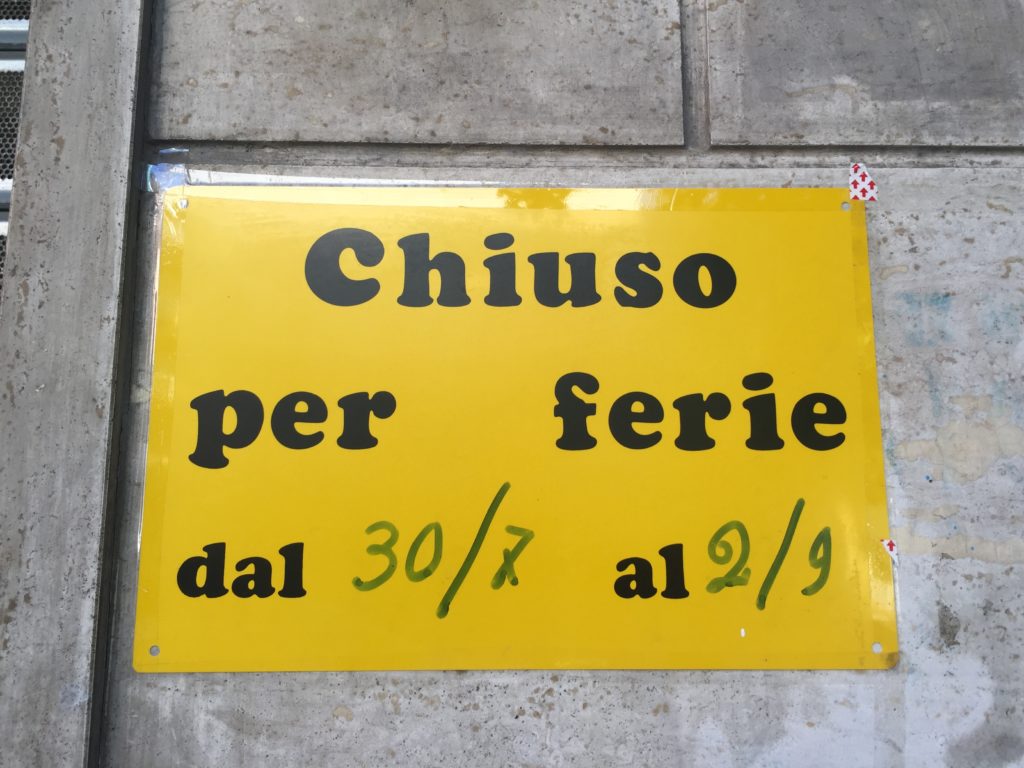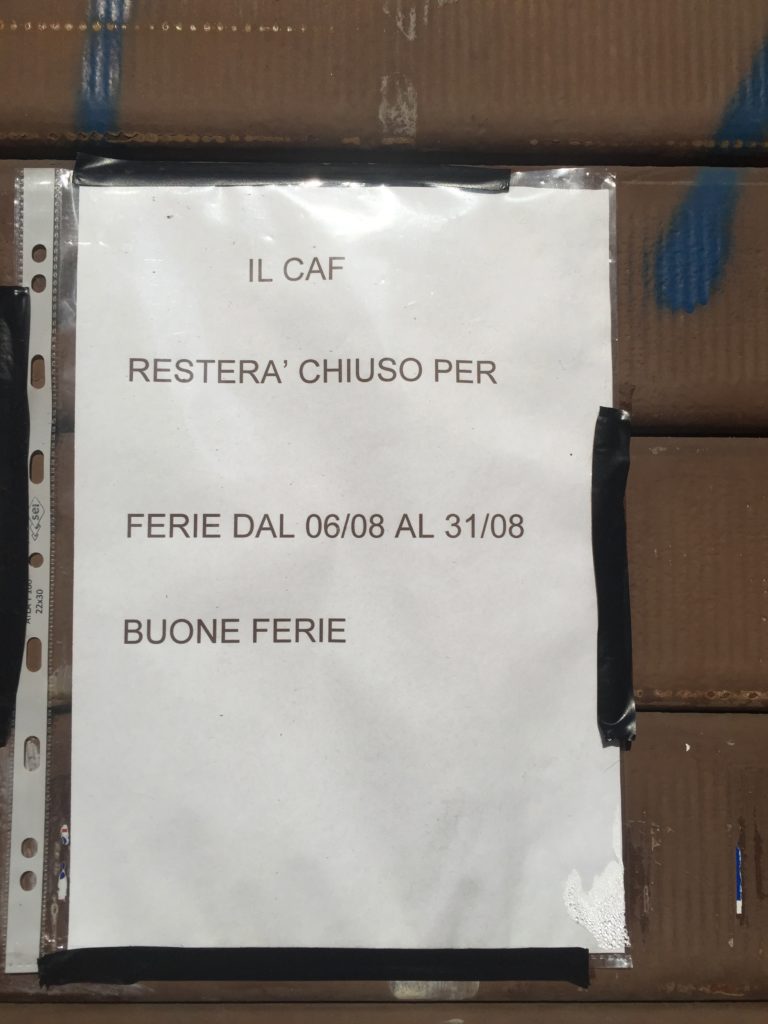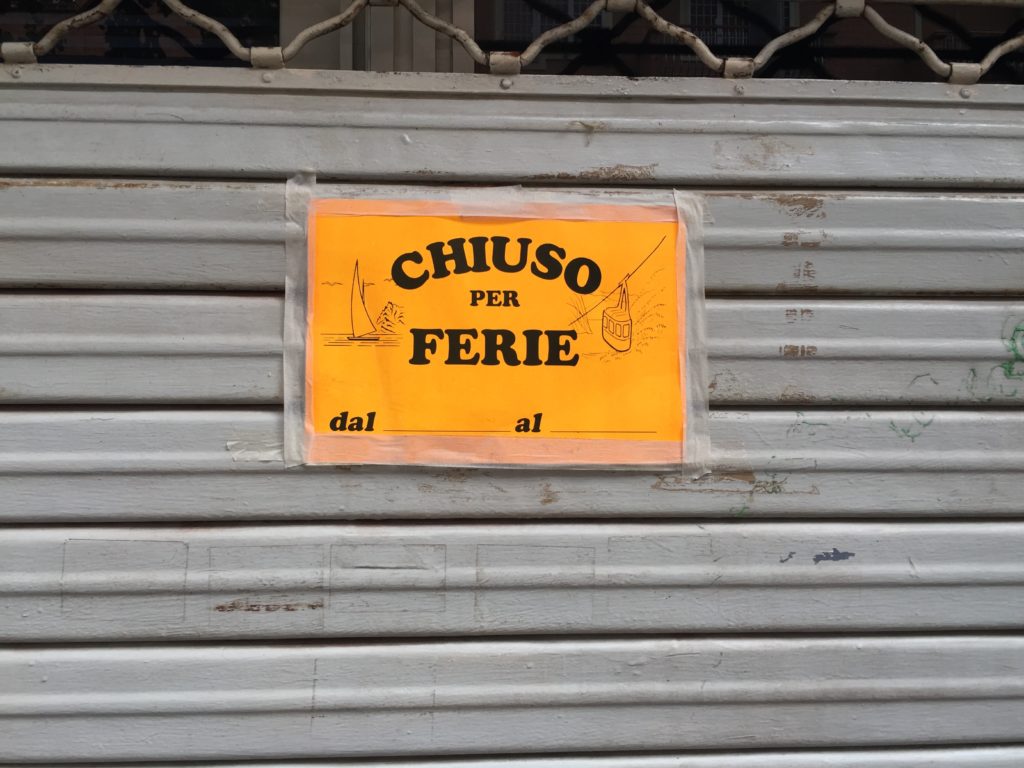Rome in August
“Pronto Margherita ? “
“Si.”
“Ciao, sono Claudio. Tu ad agosto non parti, vero ?”
“No Claudio, non parto. Tu sai che per volonta’ mia ad agosto ci sto sempre”
“E gia’, e’ questa la tradizione tua, vero. Allora ti posso portare qualcosa, salgo subito da te ?
(“Marjorie, it is Claudio. You are here are you not ? You are not going away in August ?” “No Claudio, I chose to stay in Rome in August.” “Yes, that is your tradition. May I bring you something ?”)
And within minutes, our elderly neighbor Claudio is outside the door, in pleated shorts. At his feet a huge bag from which emerge a motley collection of house plants that for the last 11 Augusts I have looked after, including the aspidistra with the cigarette hole through one leaf when his adolescent grandson played a little trick on nonno. And there is a new addition too, Claudio indicates, beaming: an apple-shaped cactus, with very sharp points. “Do not touch it !” says Claudio. “It is villainous, an anniversary gift from my wife.” And with a quick kiss to both my cheeks, and a “buon ferragosto, e grazie !”, Claudio is gone down the steps.
It is evening on August 10 and I am eager to be on the terrace, watching the light transform from gold to pink to silver; most of all I want to listen, because August is the time in Rome when you hear sounds you cannot hear at any other time of the year.
But the doorbell rings again. I was sure it would, because she preannounced her visit that morning: a flushed Maria Grazia fresh from a combative session in her ground floor storeroom. I had heard her there when I picked up my mail; tugging and pulling at a chaotic pile and then uttering a relieved “ecco ! “ : two suitcases had been disentangled from the tangle.
Maria Grazia was also preparing her departure.
“The cats’s meals are all arranged as they always are. The white meat is on the left in the freezer. Just take it out the day before. I have chopped it fine. Add the olive oil, that’s where it always is, and then at night give a raw egg one day, and the next day the dry kibble. I’ve left a crack on the terrace door open so Artemisia can get at her grass. It is such a relief to have you here, tesoro, to protect me from the burglars! The cat is no help with that!”
And Maria Grazia is off too, in a trail of perfume, leaving me as a thank you a plate of over-ripe peaches with a small note: “grazie e buon ferragosto!”
On the terrace at last, I settle into one of the rites I most love during my Roman year: noting how day after day, from August 1 till about 20, the traffic in my city center Rome apartment drifts into diminuendo. As we creep towards Ferragosto, August 15, the ancient Roman holiday honoring the completion of the harvest, there can at mid day be minutes when not a car is to be heard.
Noise pollution is so much a part of our Roman lives that we are not even aware of how much we are missing; it is only in August that I hear a bee buzzing on the terrace thyme. Cracking pine nuts on my terrace with a big stone makes a sound that seem thunderous, and I am nearly sure I can hear a fat lizard as he scurries away under a pot to avoid a flying pine nut shell.
The parrots that streak across the mid August sky in sudden whirls of green are like celestial bolts.
But most striking in the otherwise silence is the sound of the church bells, church bells from near and far. Each of these has its own distinct tone, and timbre. Some are warm and golden, some are sober and upright, some tickle you, some draw you in. Some are single bells, and most are multiples. Some are more syncopated; some are liquid. For the August resident of Rome, August is cornucopia if you love bells because with the exception of early afternoon, when you should be asleep, they peel all day long, beginning at 6 AM, and many of them have solos, so you can hear them alone. At noon however, they nearly all come together, and that is a glory because besides the familiar rings you hear year round, there is a chorus of the voices that make themselves heard to me only in August.
One year when it was too hot to sleep and I was feeling curious, I was up with the dawn and with a map I had drawn of the churches I thought I heard, I darted around listening so I could put a positive assignation to each. I had several wrong. The warm bells were Santa Maria in Trastevere and not San Pancrazio for example.
San Pietro in Montorio booms its bells, and rings at the same time as the noontime canon on the Janiculum (which in August sounds like an explosion; the rest of the year, with the roar of traffic and of chattering life, it is no more than a put-put.) And my favorite church in Rome, ancient San Bendetto in Piscinula, with Rome’s oldest bell tower, can indeed be heard on my terrace when in mid August day you can hear a pin drop in Rome.
When I was a little girl in Rome, everyone, except those who really could not afford to even return to their villages, was gone. In my bourgeois building in Parioli, well-brought-up little children left Rome carrying their rubber life savers, off to a month at the seaside, or already decked out in their sweaters, off to a month in the mountains. The porter, surely weary from carrying everyone’s suitcases down to their cars, managed still to stand poker stiff at his position and made a ceremonial show of waving to departing families, mouthing words that always struck me with their pomp and fed my childish self importance : “buona villeggiatura !” “Have a good holiday”.
At night I lie in bed and listen to the absolute silence, wondering if I might again hear an owl a, year-round sound when I was a child. Perhaps if I listen more clearly? I hear the trains rumbling to the coast, a sound as soothing as a lullaby, drowned out for the rest of the year. And I hear Maria Grazia’s cat downstairs, excitedly chasing lizards on the terrace.
Between those of us who stay in Rome develops a warm and natural complicity. Companionably I and several ladies chose among the zucchini in the one neighborhood market stall that keeps working in mid August. There are maids there who have been left behind to look after dogs and homes; there are many late middle aged signore who cannot leave their own mothers, and while longing for villeggiatura themselves, must content themselves with long calls on their cell phones with their children and grandchildren in villeggiatura in the Canary Islands, in Scotland, at the grey beaches of Santa Severa. In August the ladies let themselves go; their hairdressers are all in villeggiatura, anyway, and they slip into comfortable sleeveless house dresses with big floral prints. They discuss what fruits are most digestible for their ancient mothers, and select the eggplants without the bitter seeds.
No one takes more than their share of the produce — without a word being spoken, it is understood that there is not much, and we will equitably divide it out. The vendor, a middle aged lady herself, also in a house dress, tells us how the night before a boar family ate all of their watermelons.
Also in the market are the hungry Nigerians who cannot beg in front of their usual bars and pastry stores because those stores are closed for villeggiatura, big “chiuso per ferie” signs across their doors. They walk the markets looking for someone to talk to. They crave conversation and connection. I learn story after story, in August, about their harrowing sea crossings from Libya to Sicily and what their bleak experiences have been in Italy. All of my pocket change goes to the Nigerians : to Simon, to Happy, to Ralph. They all tell me that they will pray for me, and say that if they get a green card for America, they will think of me.
The month goes on. One day, late in the afternoon while I am watering my terrace, a glass of wine in my hand, I note in surprise that the traffic has returned on Viale Quattro Venti : the whine of the motorbikes, the speeding of the cars. Sure enough, Claudio is back that evening, pink with sunburn; he reports that he is well rested, and retrieves his plants. Maria Grazia is back the next day, and compliments me on looking after Artemisia so well. I tell her it was my pleasure, and she presents me with a bottle of grappa made in the mountains where she was in villeggiatura.
As life returns to its characteristic rhythm, I throw my mind forward to the following summer, and long wistfully for that most perfect of all August villeggiature – that one in Rome.



